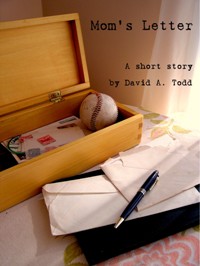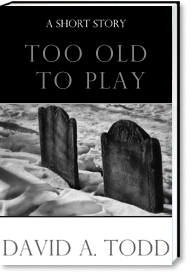I’ve read “Mom’s Letter” to three different critique groups. Well, I actually read it to two; I sent it by e-mail to the third one and let them critique it in the next meeting. Actually, in the two groups where I read it, I broke down crying mid way through, and someone else had to finish it for me. Oh, I also shared it with an on-line critique group when I first wrote it, back around 2004.
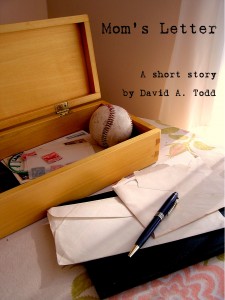 One reaction I received from each of these four groups is the lack of feeling from the father—my father. While not all parts of the short story are true, the ride home from scout camp is, as close to word for word as I can make it. One item of fiction at that point: I didn’t do the mile swim at camp that year. I matured late as a swimmer, and think I was 18 before I could swim a mile.
One reaction I received from each of these four groups is the lack of feeling from the father—my father. While not all parts of the short story are true, the ride home from scout camp is, as close to word for word as I can make it. One item of fiction at that point: I didn’t do the mile swim at camp that year. I matured late as a swimmer, and think I was 18 before I could swim a mile.
Back to Dad. People don’t like how he broke the news to me that Mom was on her death-bed in the hospital. They things like, “I want to smack him in the head.” “Oh, what a cruel, unfeeling man!” Funny, though, I didn’t intend to portray him that way, nor did he seem that way to me at the time. I asked when Mom was getting out of the hospital, and he said, “You don’t understand. She’ not getting out this time.”
The on-line crit group said I simply had to make a change, to give the dad some greater degree of feeling. I wasn’t sure why I had to do this. As a thirteen year old, I didn’t find dad unfeeling. He spoke to me directly, expressing surprise that I hadn’t noticed all summer that Mom was dying. I felt that the fault was mine. Possibly I was self-absorbed. Possibly I was subconsciously ignoring the obvious. Whatever the reason, I hadn’t seen it, and Dad was surprised at that.
I suppose readers fault him for not having told his son before that what was happening. Why he didn’t I don’t know, but no such conversation took place before that ride in the car.
Looking back on that, close to 47 years later, I think I must have understood that Dad was grieving too, but that he had to stay strong for the sake of his three children. One scene from the short story that’s true is Dad laying on the couch in the living room that Mom used to lie on, and pound the wall in anguish, the wall Mom used to pound in pain, and say, “Why did you have to die, Dotty? Why?” That went on for a couple of weeks.
Yet, he never broke down, never showed any weakness. Grief, yes; but weakness, no. Of course, he had known what was happening. For years he knew her days were numbered, then for months he knew the end was near. I think he did a lot of grieving before she died.
As I said in my last post, maybe this short story will help someone else out in their grieving process. Maybe they will understand what their surviving parent is going through. If so, “Mom’s Letter” will have accomplished something.
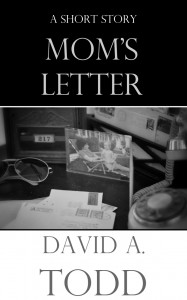
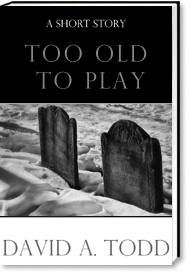
 of my first self-publishing piece. My short story “
of my first self-publishing piece. My short story “